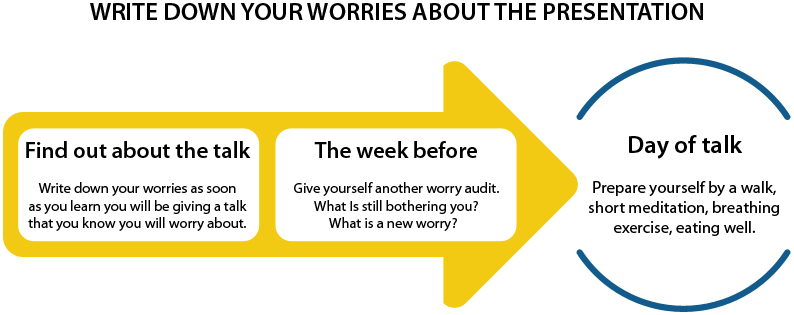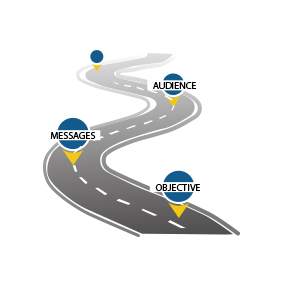Here’s some advice from a psychologist, Sian Beilock, on how to perform better under pressure. Let’s apply it to your worries about an upcoming presentation.
Take a walk: Have you ever been very anxious or upset and then taken a walk? It probably calmed you down. After your walk you’ll feel calmer and wonder why you were so upset in the first place.
Change your self-talk: Instead of telling yourself; “I am so anxious. I hope I do OK,” say, “I am excited and I can feel it. This means I’m going to sound energetic.”
Write down your worries before an event: This gets them out of your mind. I suggest you write them down when you first learn you will be giving the presentation that worries you.
Sian’s book: How the Body Knows Its Mind

WORRIES
WHEN YOU LEARN YOU’RE GIVING A TALK
Time: “I don’t have time to put this together.” Make a plan to get it done.
Help: “I don’t have all the information.” Write down who can actually give you information or guide you to it.
Experience: “I’ve never talked in front of this many people.” Find a coach to give you some pointers, or go on line and look up advice for speaking to 300 people.
PowerPoint: “I really don’t know how to make effective slides.” Find someone in your company to help or hire a PowerPoint expert. Compare costs.
Travel: “I hope the plane arrives on time.” Never book the last plane out–you’ll be in for guaranteed stress.
THE WEEK BEFORE
Rehearsal: “I never really rehearse my talks. I wing it.” Rehearse many times alone, and with colleagues or a presentation coach. IT WILL CALM YOU DOWN.
Logistics: “I don’t know what the room will be like.” Ask to see the room when you arrive or get there early enough to scope out the room.
Sleep: “I don’t have time to sleep.” The studies are out there. To be effective you need at least 7 hours of sleep–and 8 is even better.





